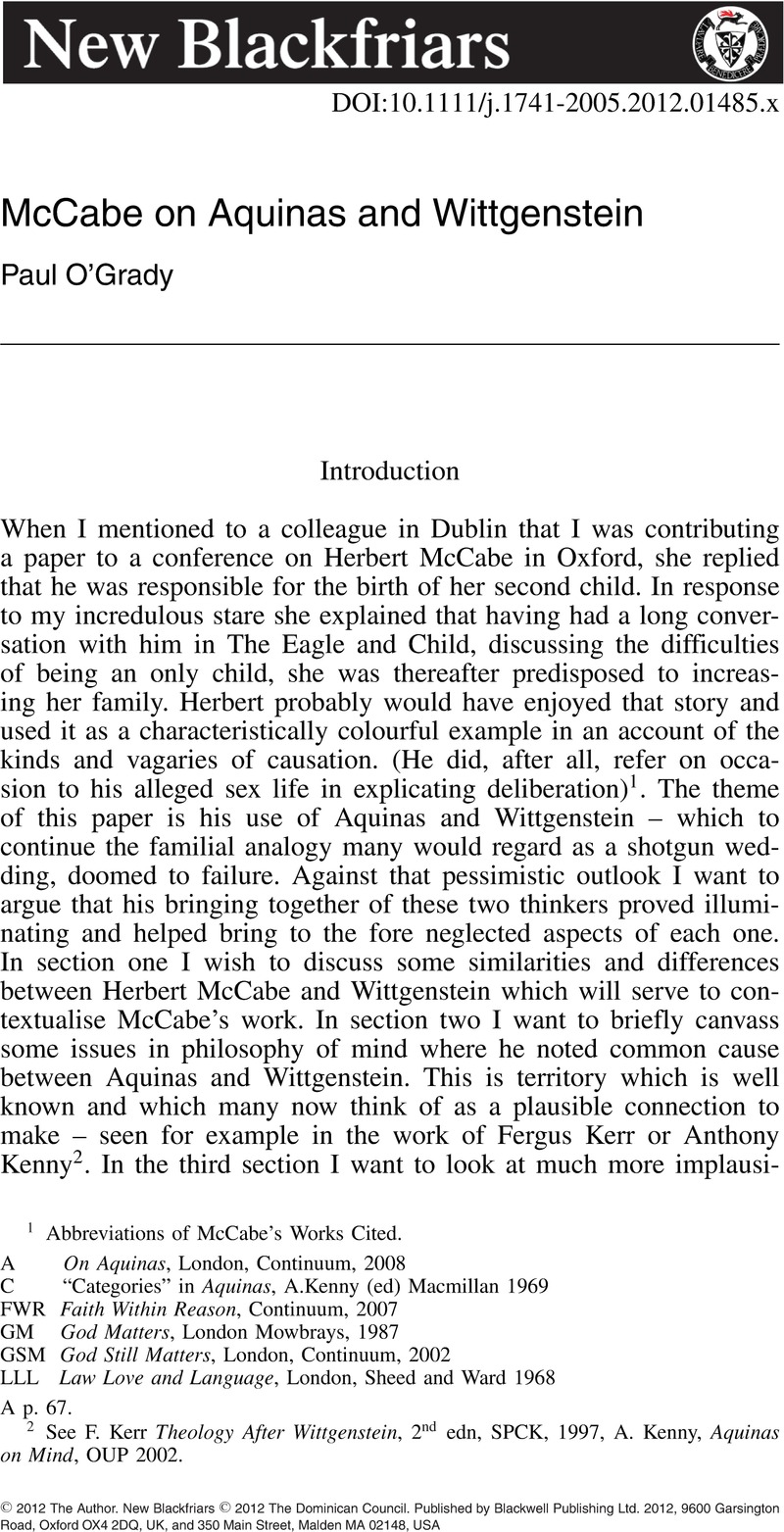Published online by Cambridge University Press: 01 January 2024

1 Abbreviations of McCabe's Works Cited. A On Aquinas, London, Continuum, 2008Google Scholar C “Categories” in Aquinas, A.Kenny (ed) Macmillan 1969 FWR Faith Within Reason, Continuum, 2007 GM God Matters, London Mowbrays, 1987Google Scholar GSM God Still Matters, London, Continuum, 2002Google Scholar LLL Law Love and Language, London, Sheed and Ward 1968Google Scholar A p. 67.
2 See Kerr, F. Theology After Wittgenstein, 2nd edn, SPCK, 1997Google Scholar, Kenny, A., Aquinas on Mind, OUP 2002Google Scholar.
3 Ray Monk, Wittgenstein: The Duty of Genius, 1991, p. 275.
4 “Foreword” to FWR p.vii.
5 Monk op cit p. 488.
6 Philosophical Remarks, Oxford: Basil Blackwell, 1975Google Scholar, “Foreword”.
7 See “Wittgenstein in Ireland”, Hetherington, George, Irish University Review, Vol. 17 no. 2 Autumn 1987, p. 176Google Scholar.
8 Zettel, Oxford: Basil Blackwell, 1967, #455Google Scholar.
9 LLL.
10 GM p. 246ff.
11 RW p. 79.
12 Work on Oneself, Arlington: IPS Press, 2008 ch. 2Google Scholar.
13 RW p. 165.
14 A p. 4.
15 RW p. 159.
16 WOO, ch. 2.
17 See Swinburne, R., The Evolution of the Soul, 2nd edn., Oxford: Clarendon Press, 1997CrossRefGoogle Scholar; Taliaferro, C., Consciousness and the Mind of God, Cambridge: CUP, 2005Google Scholar.
18 See Kerr, F. Theology After Wittgenstein, 2nd edn. London: SPCK, 1997Google Scholar.
19 See Putnam, H. “Aristotle after Wittgenstein” in Words and Life, Cambridge Ma.: Harvard University Press, 1994Google Scholar; McDowell, J., Mind and World, Cambridge Ma.: Harvard University Press, 1996Google Scholar, BonJour, L., A Defence of Pure Reason, Cambridge; CUP, 1998Google Scholar.
20 FWR p 123–124.
21 A p. 123.
22 A p. 133.
23 FWR p. 61.
24 GSM p. 13.
25 C p. 69.
26 C p. 72.
27 A p. 18.
28 C p. 90.
29 C p. 91.
30 For a discussion see my Relativism, Chesham: Acumen, 2002, ch. 4Google Scholar.
31 A p. 11.
32 “Quidquid recipitur ad modum recipientis recipitur”, “Whatever is known is known according to the mode of the knower”– for example in ST I q.75 a.5 ad3.
33 C p. 67.
34 See Stump, Eleanore, Aquinas, London: Routledge, 2003, chXGoogle Scholar; Williams, Anna, “Is Aquinas a Foundationalist?” in New Blackfriars Vol.91 n.1031, Jan 2010CrossRefGoogle Scholar.
35 On Certainty, Oxford: Basil Blackwell 1969, #97Google Scholar.
36 See for example FWR p. 52.
37 FWR p. 53.
38 Austin, J.L., Sense and Sensibilia, Oxford: Clarendon Press, 1968, p. 68nGoogle Scholar.
39 C p. 75.
40 See Recanati, Francois, Perspectival Thought: A Plea for Moderate Relativism, Oxford: OUP, 2007.CrossRefGoogle Scholar
41 GSM p. 21.
42 GSM p. 2.
To send this article to your Kindle, first ensure no-reply@cambridge.org is added to your Approved Personal Document E-mail List under your Personal Document Settings on the Manage Your Content and Devices page of your Amazon account. Then enter the ‘name’ part of your Kindle email address below. Find out more about sending to your Kindle. Find out more about saving to your Kindle.
Note you can select to save to either the @free.kindle.com or @kindle.com variations. ‘@free.kindle.com’ emails are free but can only be saved to your device when it is connected to wi-fi. ‘@kindle.com’ emails can be delivered even when you are not connected to wi-fi, but note that service fees apply.
Find out more about the Kindle Personal Document Service.
To save this article to your Dropbox account, please select one or more formats and confirm that you agree to abide by our usage policies. If this is the first time you used this feature, you will be asked to authorise Cambridge Core to connect with your Dropbox account. Find out more about saving content to Dropbox.
To save this article to your Google Drive account, please select one or more formats and confirm that you agree to abide by our usage policies. If this is the first time you used this feature, you will be asked to authorise Cambridge Core to connect with your Google Drive account. Find out more about saving content to Google Drive.